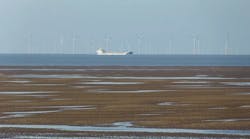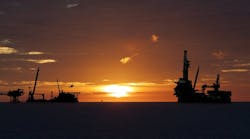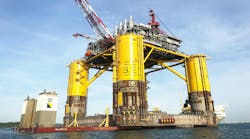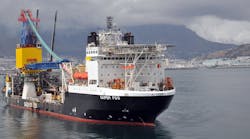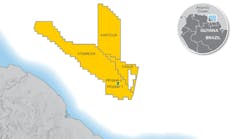Offshore staff
LONDON – Ophir Energy has awarded upstream front-end engineering and design (FEED) contracts for the Fortuna floating LNG (FLNG) project in block R, offshore Equatorial Guinea to two contractor consortia.
One is McDermott Marine Construction and GE Oil & Gas UK. The other is Subsea 7 and Aker Solutions.
This will be a competitive process, with the scope of work including subsea development design that will allow the two consortia to submit their engineer, procure, construct, install, and commission (EPCIC) tenders at the end of FEED, one of which will be selected for the final investment decision (FID).
The main focus will be on defining the number of wells required at first gas, the cost of the development, and delivery times for critical long lead subsea items such as trees.
The FEED process will be completed at the end of 1Q 2016, with FID following in mid-2016. Ophir expects first gas in mid-2019.
In May, Ophir announced that its midstream partner Golar LNG would build, own, and operate theGimi FLNG vessel in return for a tariff. Golar will soon start work on a separate FEED study for the midstream element of the project.
Gimi will likely have a capacity of around 2.2 MMt/yr. With this throughput, and installation of late-in-life compression facilities, the 800 bcf (22.7 bcm) in the Fortuna field demonstrated by a drillstem test late last year should be ample to deliver a production plateau of around 330 MMcf/d (9.3 MMcm/d) for more than 30 years, Ophir claims.
The company is also considering a second FLNG vessel to develop unallocated gas resources in block R. It would likely take an investment decision once the Fortuna field has started production, with a view to having the second vessel operational by the middle of the next decade.
CEO Nick Cooper said: “The selection of FLNG to monetize our block R resource base has drastically reduced gross development capex to first gas from the c.$3billion estimates for a conventional LNG plant to c.$800 million for FLNG, and has also reduced development lead time; thereby accelerating first gas by two to three years to 2019…
“The potential application of a second leased FLNG vessel…would accelerate the production of contracted resource and expand the total resources base to be commercialized. A second vessel would be synchronized with the cash flow from the initial trains, thereby minimizing capex exposure to Ophir and materially increasing the Fortuna FLNG project’s overall value.”
07/09/2015
